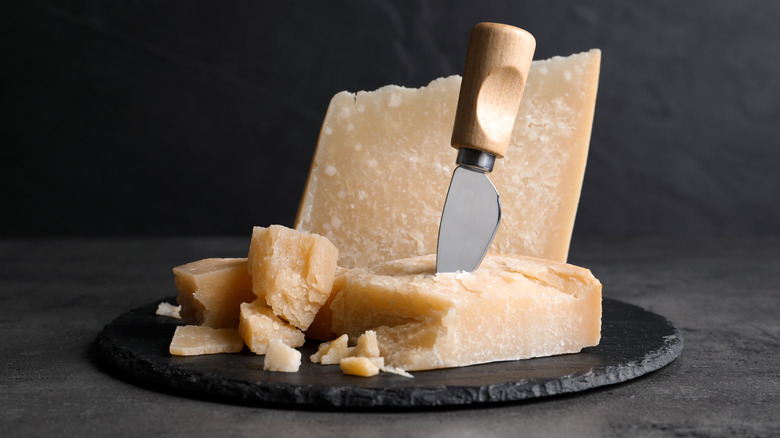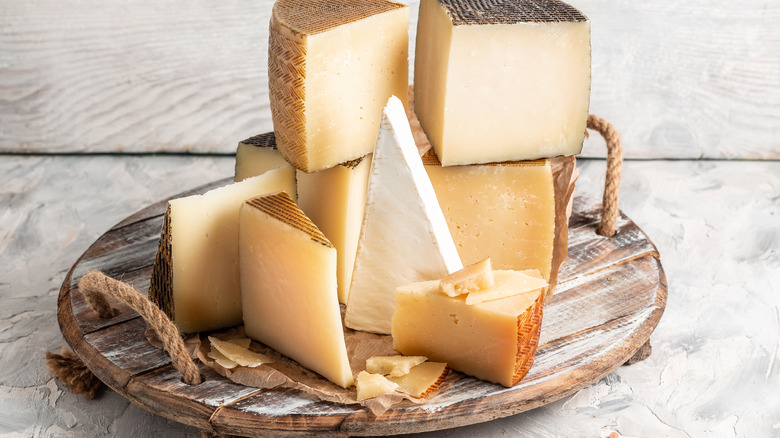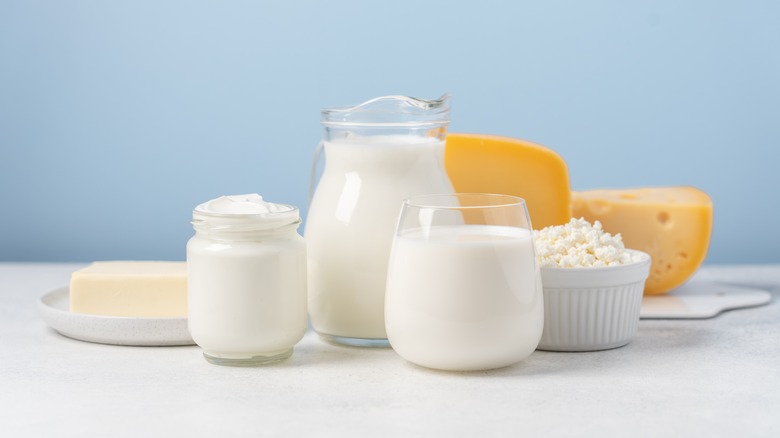Can You Eat Hard Cheese After Its Expiration Date?
It's safe to assume that nobody actively enjoys wasting food. Throwing away food is the equivalent of tossing money right into the trash can, not to mention it's bad for the environment as well as your wallet. In fact, excessive food waste contributes up to 8% of human-caused greenhouse gas emissions, according to the World Wildlife Fund. When food is thrown away, it winds up rotting in a landfill and as it rots, it releases harmful methane gas into the atmosphere.
It's always a good idea to avoid wasting food when possible. Of course, when the food begins to spoil, stale, or grow mold, it's definitely past salvaging. However, there are plenty of items that remain perfectly fine to eat, even after they have been deemed "expired." Most packaged food items that are sold in grocery stores carry some type of expiration date, after which some people assume it is expired and needs to be discarded immediately. However, just because the expiration date has passed, that doesn't mean the food should be headed straight to the landfill, according to the USDA. Many items remain perfectly fine and safe to eat long after their expiration date.
Hard cheese can last for months after its expiration date
The dates that are printed on food labels do not always coincide with the actual spoilage of the item. And not all the dates are necessarily expiration dates. Items with a "best by" date simply indicate when the food will be at its peak freshness or quality, while a "sell by" date is when the food should be removed from retailers' shelves, not necessarily when it goes bad, according to Good RX. An expiration or "use by" date does provide a general guideline for when food should be consumed, but it is not a hard and fast deadline.
Hard cheeses, in particular, remain safe to eat because of their low moisture content. The lack of moisture means bacteria does not spread as quickly, so it stays fresher longer. Therefore, hard cheeses, like Parmesan and Pecorino, have a shelf life of up to six months. They can remain good for up to two months after the printed expiration date, even after the package is opened, so long as it is stored properly, per Does It Go Bad. And if a hard cheese does develop a mold, it is usually fine to simply slice off the affected piece and continue to use the rest of the block as normal, according to Prevention. However, if a hard cheese begins to taste or smell off, or looks dried out or excessively moldy, then it is probably time to toss it in the garbage.
Soft cheeses have a short shelf life
Not all foods can be safely eaten once the expiration date has passed, cheeses included. Soft cheeses with a high moisture content, such as brie, ricotta, or cottage cheese, should probably not be kept for more than a week in the fridge. "Anything with a high moisture content will allow the bacteria and mold to move easily from one section of the food to another...so, toss anything that has visible spoilage," Isabel Maples, spokesperson for the Academy of Nutrition and Dietetics, explained to Prevention. Semi-soft and semi-firm cheeses, including Gouda, Cheddar, and Swiss, fall somewhere in the middle. They tend to have a shelf life of several months, and can generally be safely eaten for up to three weeks after the listed expiration date (per Does It Go Bad).
Other perishable food items also may not have a long shelf life. Some dairy items, such as milk and yogurt, don't tend to stay good for much longer than the suggested expiration date. However, shelf-stable, salty, and acidic foods like butter, pickles, and many condiments can last for several months or even years when stored properly. So while expiration dates are a helpful guideline for deciding which foods are safe to eat and which should be tossed, it's always a good idea to do your own research before deciding to throw away what could be perfectly good food.


